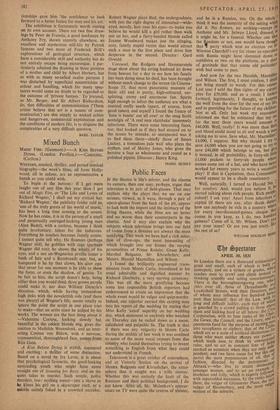Public Faces
IF the theatre is life's mirror, and the cinema its camera, then one may, perhaps, argue that television is its pair of field-glasses. That may explain why the plays that we see on our screens, viewed, as it were, through a pair of opera-glasses from the back of the pit, appear to lack both the import and the intimacy of the living theatre, while the films are no better and no worse than their counterparts in the cinema. And it may also explain why the subjects which television brings into our field of vision from a distance arc always the most satisfying. This week we have had a rich selec- tion of close-ups, the most interesting of which brought into our homes the varying personalities of Prince Rainier, Grace Kelly, Marshal Bulganin, Mr. Khrushchev, and Messrs. Harold Macmillan and Wilson.
I found the brilliantly engineered trans- mission from Monte Carlo. introduced in his usual admirable and dignified manner by Richard Dimblcby, a very moving ceremony. This was all the more gratifying because some less responsible British reporters had endeavoured to create an impression that the whole event would be vulgar and quip-worthy. Indeed, one reporter carried this carping note into his report of the wedding by stating that Miss Kelly 'acted' superbly on her wedding day, which statement to anybody who watched on Thursday can be nailed down as a mean, calculated and palpable lie. The truth is that if there was any vulgarity in Monte Carlo during the middle of last week it was confined to some of the more vocal voyeurs from this country who found themselves trying to invent something in English from what they could not understand in French.
Television is a great catcher of atmosphere, and at Victoria Station on the arrival of Messrs. Bulganin and Khrushchev, the atmo- sphere that it caught was a trifle sinister. Whether this was entirely the fault of the Russians and their political background, I do not know. After all, Mr. Malenkov's appear- ances on TV were quite the reverse of sinister,
SPECTATOR, APRIL 27, 1956 and he is a Russian, too. On the whole I think it was the austerity of the setting which did it. No flowers, no nothing—except Sit Anthony and Mr. Selwyn Lloyd, dressed, as it might be, for a funeral. Whether one likes the Ilussians or not, one would have thought that la party which won an election on Sir Winston Churchill's cry for closer co-operation with Russia might have slammed down a,11 aspidistra or two on the platform, as a mats of gratitude that that astute old politicians wish had come to pass.
And now for the two Harolds, Macmillan and Wilson. The first, I must confess, 1 COO not bring myself to watch. For this reason' Last year I sold the film rights of my current, play for £50,000, and as a result I Woke' forward, legitimately, I thought, to keening the wolf from the door for the rest of my ilk' and to providing for the future of my children. Not at all. Only last week my accountant informed me that he estimated that mY Itt% for the next three years would amount t,,6 £46,000. Well, really! It was more than flesh and blood could stand to sit and watch a manasking me to save. Save what, Mr. Macmillan,, £4,000, I suppose. But why should 1 trY 1° save £4,000 when you are not going to trY t° save £46,000 which belongs to me, but glue it instead, in all probability, in forty-six Pt! £1,000 packets to forty-six people whit's; names come out of a hat, and who have nev,e; worked for twenty years to write a successitt' play? If that is Capitalism, then Communism would appear to be a shade reactionary.
Well, naturally, I turned to Harold N°.:0 for comfort. And, would you believe it, started talking about rich people. Rich peepici indeed! I ask you! Apart from inheritors °t capital (if there arc any, after death dutie,.$) e how can anybody be rich in a country WIT t for every two-thousand-guinea cheque ttd comes in you keep, as 1 do, two hundred guineas? Come off it, Mr. Wilson. Don't Y°o o pay your taxes? Or are you just crazy, ,, the rest of us? WILLIAM DOUGLAS Hottf WILLIAM DOUGLAS Hottf










































 Previous page
Previous page